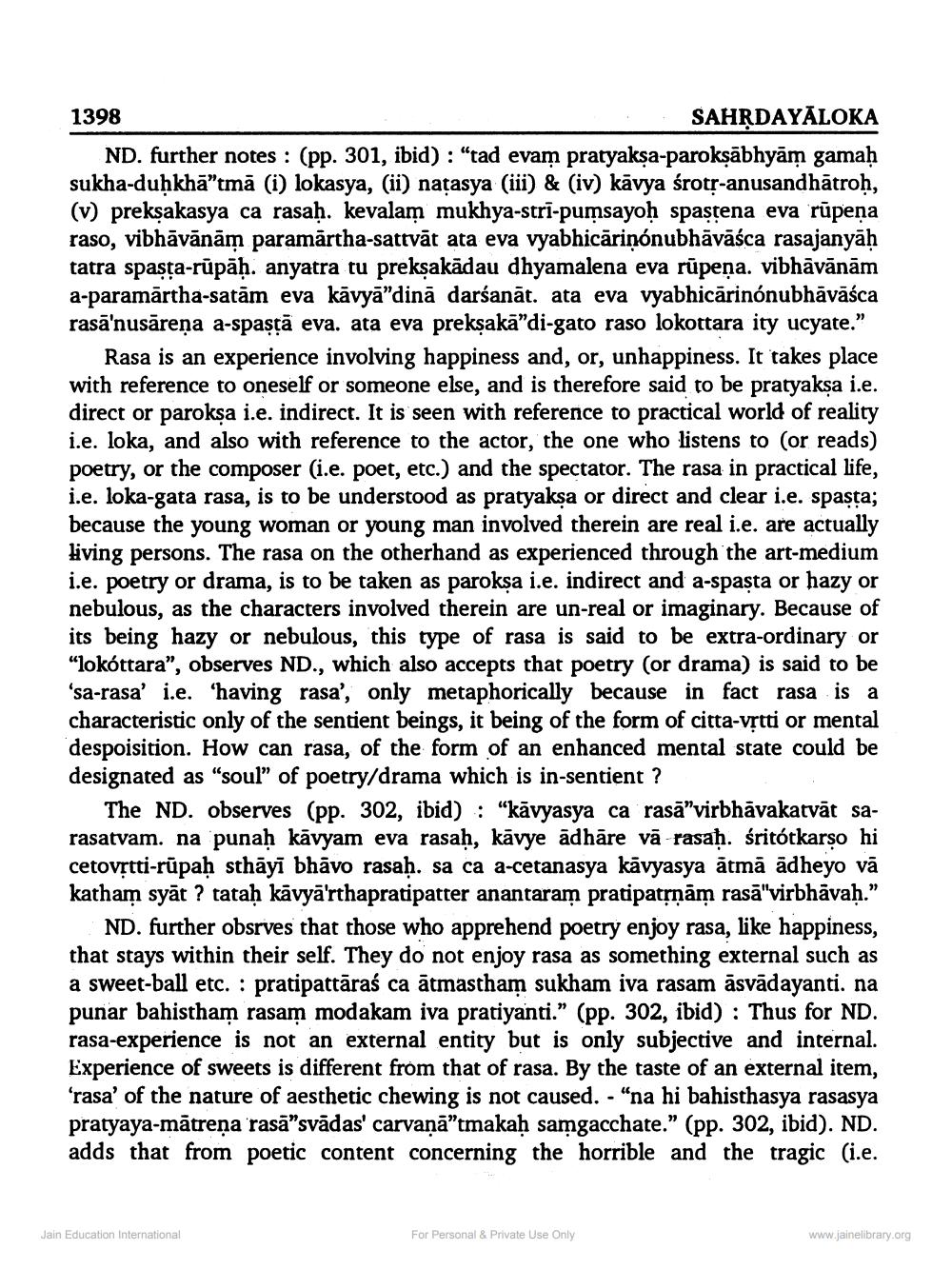________________
1398
SAHRDAYĀLOKA
ND. further notes : (pp. 301, ibid) : "tad evam pratyakşa-parokşābhyām gamaḥ sukha-duḥkhā"tmā (i) lokasya, (ii) natasya (iii) & (iv) kävya śrotr-anusandhātroh, (v) preksakasya ca rasaḥ. kevalam mukhya-strī-pumsayoh spastena eva rūpena raso, vibhāvānām paramārtha-sattvāt ata eva vyabhicāriņónubhāvāśca rasajanyah tatra spasta-rūpāh. anyatra tu preksakādau dhyamalena eva rūpena. vibhāvānām a-paramārtha-satām eva kāvyā"dinā darśanāt. ata eva vyabhicărinónubhāvāśca rasā'nusāreņa a-spastā eva. ata eva preksakā”di-gato raso lokottara ity ucyate."
Rasa is an experience involving happiness and, or, unhappiness. It takes place with reference to oneself or someone else, and is therefore said to be pratyaksa i.e. direct or paroksa i.e. indirect. It is seen with reference to practical world of reality i.e. loka, and also with reference to the actor, the one who listens to (or reads) poetry, or the composer (i.e. poet, etc.) and the spectator. The rasa in practical life, i.e. loka-gata rasa, is to be understood as pratyaksa or direct and clear i.e. spasta; because the young woman or young man involved therein are real i.e. are actually living persons. The rasa on the otherhand as experienced through the art-medium i.e. poetry or drama, is to be taken as paroksa i.e. indirect and a-spasta or hazy or nebulous, as the characters involved therein are un-real or imaginary. Because of its being hazy or nebulous, this type of rasa is said to be extra-ordinary or "lokottara", observes ND., which also accepts that poetry (or drama) is said to be 'sa-rasa' i.e. 'having rasa', only metaphorically because in fact rasa is a characteristic only of the sentient beings, it being of the form of citta-vrtti or mental despoisition. How can rasa, of the form of an enhanced mental state could be designated as “soul" of poetry/drama which is in-sentient ?
The ND. observes (pp. 302, ibid) : "kāvyasya ca rasā"virbhāvakatvāt sarasatvam. na punaḥ kävyam eva rasaḥ, kāvye adhāre vā rasaḥ. śritótkarso hi cetovstti-rūpaḥ sthāyī bhāvo rasah. sa ca a-cetanasya kāvyasya åtmā ādheyo vā katham syāt ? tataḥ kävyā'rthapratipatter anantaram pratipatņņām rasā"virbhāvaḥ.”
ND. further obsrves that those who apprehend poetry enjoy rasa, like happiness, that stays within their self. They do not enjoy rasa as something external such as a sweet-ball etc. : pratipattāraś ca ātmastham sukham iva rasam āsvādayanti. na punar bahistham rasam modakam iva pratiyanti.” (pp. 302, ibid) : Thus for ND. rasa-experience is not an external entity but is only subjective and internal. Experience of sweets is different from that of rasa. By the taste of an external item, 'rasa' of the nature of aesthetic chewing is not caused. - "na hi bahisthasya rasasya pratyaya-mātreņa rasā"svādas' carvaņā”tmakaḥ samgacchate.” (pp. 302, ibid). ND. adds that from poetic content concerning the horrible and the tragic (i.e.
Jain Education International
For Personal & Private Use Only
www.jainelibrary.org




